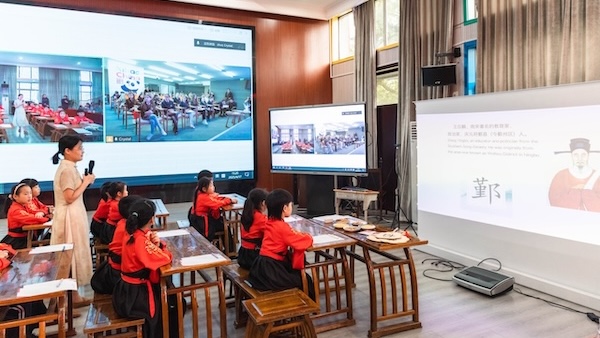AI-powered reading innovations bring warmth to World Book Day
In a softly lit auditorium inside the Guangzhou Library in South China's Guangdong Province, a digital figure emerges from a 3D holographic pod. Speaking in a natural, fluid voice, the AI-powered presenter introduces highlights of the 2025 World Book Day celebrations, ranging from an intelligent customer service bot to a futuristic reading zone powered by DeepSeek, all designed to reimagine how people engage with books.
Among these dazzling technologies, one innovation stands out for its emotional resonance: A smart companion robot tailored to support children struggling with reading.
Built on a large language model, the robot doesn't just recite stories, as it uses voices recorded by parents via an app, narrating tales in familiar tones to create an emotionally immersive experience.
Li Xiaomei, a mother of two, told the Global Times on Monday that when she doesn't have enough time to read with both of her kids as she's preparing for an English exam herself, the robot could help.
"Of course, nothing beats reading with your children in person," she noted. "But when I need to study or work, this robot takes the pressure off. It turns reading into a joy, not a chore."
Enhanced accessibility
The World Book Day, celebrated on April 23 and established by UNESCO in 1995, honors the magic of books and the minds behind them.
In 2025, the celebration has taken on a new dimension thanks to the wide usage of AI. Across China, AI is leaving its mark not just in labs, but in libraries, parks, classrooms and homes.
In Ningbo, East China's Zhejiang Province, during a community reading event at the Wangjingmen archaeological park, an AI reading figure appeared.
This one is modeled on Fan Qin, founder of the Tianyi Pavillion, an ancient library from the Ming Dynasty (1368-1644) in Ningbo. In digital form, Fan's avatar recommends classic titles and narrates ancient book-collecting tales.
"Fan isn't just a historical figure. His family's dedication to books over generations makes him a perfect cultural ambassador," Dong Keyuan, a local official and event coordinator, told the Global Times. "These familiar, approachable avatars help children engage with history and reading more deeply."
The push for the integration of AI into reading goes beyond mere entertainment.
In the children's zone, smart terminals enable kids to ask questions or request books using voice commands.
"If you want to hear a book recommended by a renowned TV host, the system can find it and even play a video in which he reads the opening chapters," said Dong.
Accessibility has also taken a step forward. A new device for children with visual impairments translates braille through tactile sensors and AI feedback.
"We used to borrow reading materials from a small selection of braille books at school," said a relative of Nuo Nuo, a blind girl who used to rely on limited braille books or audio machines. "Now, with this device, she can access hundreds of titles and explore them on her own. It's more than just reading, it's independence."
A young reader explores digital reading devices during a World Book Day event in Ningbo, East China's Zhejiang Province. Photo: Courtesy of event organizers
Interactive reading
Libraries across China have rolled out a collection of AI-powered events to engage readers with immersive experiences for the World Book Day this year.
Huang Jindong, a deputy director of the library at Minzu University of China, told the Global Times on Monday that technology has expanded the breadth of information accessible to readers and also contributed to the enhancement of humanistic literacy.
"While we embrace technological advances, we hope AI can also serve as a better guide to support readers in engaging in deep and critical reading," said Huang.
Hunan Library in Central China's Hunan Province launched innovative activities, with the AI-themed events standing out as a highlight. By leveraging digital technology, the library is enhancing public participation and the overall experience of cultural services, sparking a greater enthusiasm for reading across society.
Deng Jinglan, a publicity official with the Hunan Library in Changsha, Central China's Hunan Province, told the Global Times on Monday that the library has created a province-wide reading festival that integrates technology, reading and culture by leveraging digital technology, cultural creativity and immersive experiences.
The introduction of AI virtual librarians, equipped with natural language processing technology, not only enables the dynamic visualization of reading-related big data, but also holds the potential to deeply analyze user behavior patterns and generate personalized knowledge graphs, Deng noted.
The intelligent upgrade of reading service scenarios highlights how smart technologies are empowering and transforming traditional reading services, she said.
Shijiazhuang Library in North China's Hebei Province, in collaboration with 22 branch libraries, launched an immersive themed reading campaign centered on the book "Hebei Folk Tales."
Leveraging the creative capabilities of AI librarians, they generated 132 sets of story-themed posters and created 132 intelligent interactive characters through the AI reading assistant.
Readers can use their mobile phones to trigger immersive experiences such as conversations with AI characters and voice-narrated stories.

 Ningbo seabird project seeks international volunteers
Ningbo seabird project seeks international volunteers  Jakub's journey: From shipyard to sea
Jakub's journey: From shipyard to sea  Badminton Asia COO applauds Ningbo
Badminton Asia COO applauds Ningbo 


